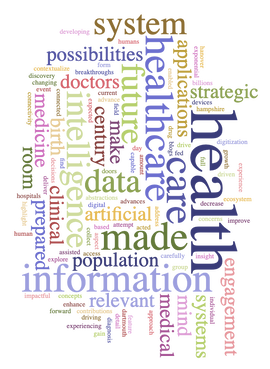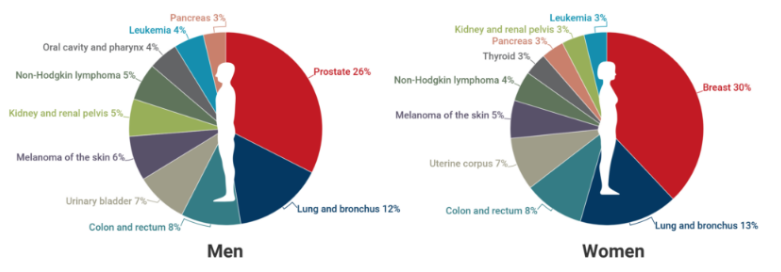Blog Author: Archita KhaireCancer is the second leading cause of death in the world after cardiovascular diseases. The World Health Organization reported 18 million new cancer cases and 9.5 million cancer deaths across the globe in 2020, approximately 49,000 new cases and 26,000 deaths every day. Cancer also has significant and increasing impacts on the economy. The annual economic cost of cancer is estimated at approximately $1.16 trillion.
There was a time when cancer was essentially a death sentence. However, in the last few decades, researchers across the world have made major advances in the mechanics behind how to prevent, diagnose, and treat cancer. Artificial Intelligence is now rapidly changing the field of oncology. From enhancing diagnosis to personalizing treatment to discovering novel anticancer drugs, AI has made significant contributions to various aspects of oncology research in just a few years. Cancer is not a single ailment, rather there are many types affecting human health. The picture below depicts a few different types for men and women. Blog Author: Archita Khaire "Every aspect of learning or any other feature of intelligence can in principle be so precisely described that a machine can be made to simulate it. An attempt will be made to find how to make machines use language, form abstractions and concepts, solve kinds of problems now reserved for humans, and improve themselves. We think that a significant advance can be made in one or more of these problems if a carefully selected group of scientists work on it together for a summer." ~ The 1956 Dartmouth Workshop in Hanover, New Hampshire and the Birth of AI. The 20th century saw the birth of Artificial Intelligence, which would revolutionize human life in the 21st century. Currently, we are in the midst of an AI revolution. We are experiencing it every day and its full magnitude is yet to be known. The possibilities of billions of people connected by mobile devices, with unprecedented processing power, storage, and access to knowledge are unlimited. These possibilities are only multiplied by breakthroughs in the fields of AI and robotics that are opening the path to a better future. Digital transformation is driving the exponential growth of health data. With digitization and connectivity becoming ubiquitous, we are more capable than ever to collect information about individual and population health. Doctors state that the best care happens only when we provide relevant information to a prepared mind in the moment. AI is the only way to decrease the amount of information that's being fed to the prepared mind, to contextualize and surface the relevant information. That is when the best medical decisions are going to be made. AI-enabled healthcare is not “the medicine of the future,” nor does it mean robot doctors rolling room to room in hospitals treating patients. Instead, AI is poised to make impactful and urgent contributions to the current healthcare ecosystem. Healthcare organizations are changing the way they use data, from a pure system of records to a system of insights that once acted on, will deliver systems of engagement. In these systems of engagement, patient outcomes and experience are top strategic priorities - and AI is expected t drive them a quantum leap forward. The healthcare system is also taking a strategic approach to personalized medicine to enhance the use of health data for treatment and research. AI presents novel ways to address old problems and opens doors to solving newly developing population health concerns. These are a few promising applications of AI in healthcare: AI-assisted robotic surgery, AI-powered virtual nurses, AI-based clinical management, AI-driven medical diagnosis, AI for clinical trials, AI in drug discovery. In future blogs, we will explore these applications in detail to gain insight into the latest advances of AI in healthcare. |
Page HitsAuthorArchita Archives
January 2023
Categories |


 RSS Feed
RSS Feed